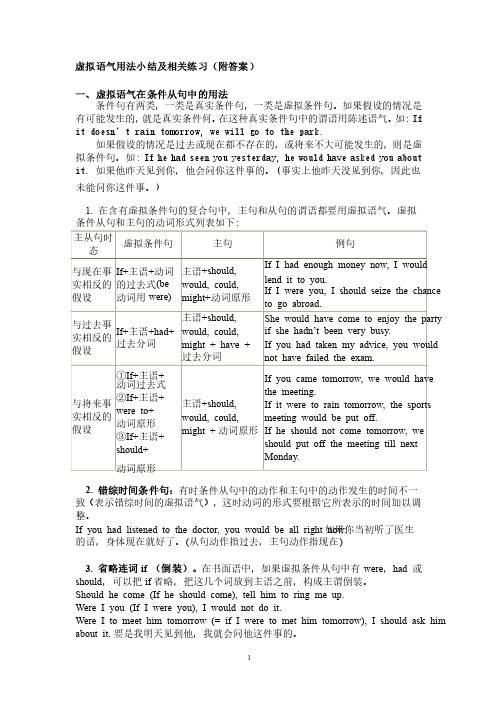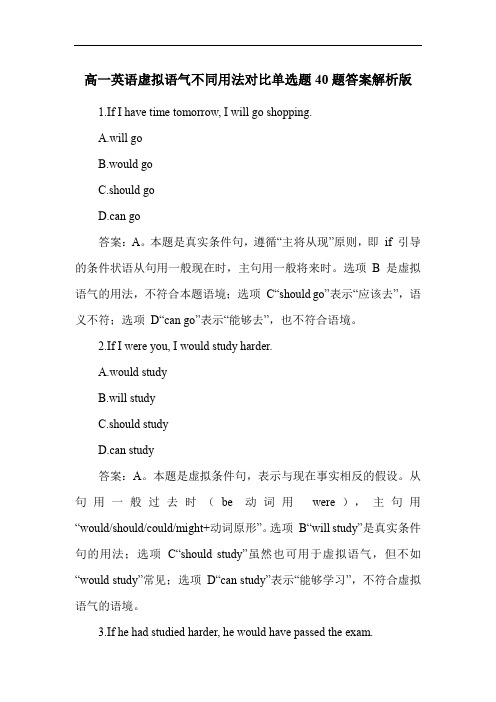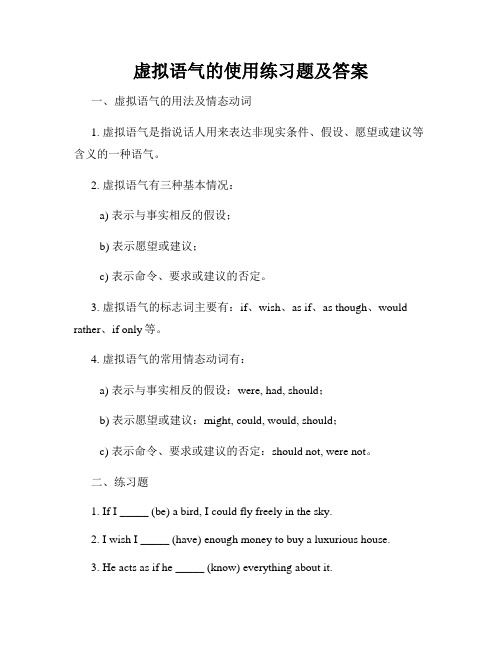虚拟语气的用法及专项练习题
虚拟语气用法小结及练习(附答案)

虚拟语气用法小结及相关练习(附答案)一、虚拟语气在条件从句中的用法 条件句有两类,条件句有两类,一类是真实条件句,一类是真实条件句,一类是真实条件句,一类是虚拟条件句。
一类是虚拟条件句。
一类是虚拟条件句。
如果假设的情况是如果假设的情况是有可能发生的,就是真实条件何。
在这种真实条件句中的谓语用陈述语气。
如: If it doesn’t rain tomorrow, we will go to the park.如果假设的情况是过去或现在都不存在的,如果假设的情况是过去或现在都不存在的,或将来不大可能发生的,或将来不大可能发生的,则是虚拟条件句。
如拟条件句。
如: : If he had seen you yesterday, yesterday, he he would have asked you about it. it. 如果他昨天见到你,他会问你这件事的。
如果他昨天见到你,他会问你这件事的。
(事实上他昨天没见到你,因此也未能问你这件事。
未能问你这件事。
) )1. 在含有虚拟条件句的复合句中,主句和从句的谓语都要用虚拟语气。
虚拟条件从句和主句的动词形式列表如下: 主从句时态虚拟条件句虚拟条件句 主句主句 例句例句 与现在事与现在事 实相反的实相反的 假设假设 If+主语+动词动词 的过去式(be 动词用were) 主语+should, would, could, might+动词原形动词原形 If I had enough money now, I would lend it to you. If I were you, I should seize the chance to go abroad. 与过去事与过去事 实相反的实相反的 假设假设 If+主语+had+ 过去分词过去分词 主语+should, would, could, might + have + 过去分词过去分词 She would have come to enjoy the party if she hadn’t been very busy. If you had taken my advice, you would not have failed the exam. 与将来事与将来事 实相反的实相反的 假设假设 ①If+主语+ 动词过去式动词过去式②If+主语+ were to+ 动词原形动词原形 ③If+主语+ should+ 动词原形动词原形 主语+should, would, could, might + 动词原形动词原形 If you came tomorrow, we would have the meeting. If it were to rain tomorrow, the sports meeting would be put off. If he should not come tomorrow, we should put off the meeting till next Monday. 2. 错综时间条件句:有时条件从句中的动作和主句中的动作发生的时间不一致(表示错综时间的虚拟语气)(表示错综时间的虚拟语气),,这时动词的形式要根据它所表示的时间加以调整。
高一英语虚拟语气不同用法对比练习题40题答案解析版

高一英语虚拟语气不同用法对比单选题40题答案解析版1.If I have time tomorrow, I will go shopping.A.will goB.would goC.should goD.can go答案:A。
本题是真实条件句,遵循“主将从现”原则,即if 引导的条件状语从句用一般现在时,主句用一般将来时。
选项B 是虚拟语气的用法,不符合本题语境;选项C“should go”表示“应该去”,语义不符;选项D“can go”表示“能够去”,也不符合语境。
2.If I were you, I would study harder.A.would studyB.will studyC.should studyD.can study答案:A。
本题是虚拟条件句,表示与现在事实相反的假设。
从句用一般过去时(be 动词用were),主句用“would/should/could/might+动词原形”。
选项B“will study”是真实条件句的用法;选项C“should study”虽然也可用于虚拟语气,但不如“would study”常见;选项D“can study”表示“能够学习”,不符合虚拟语气的语境。
3.If he had studied harder, he would have passed the exam.A.would have passedB.will passC.should passD.can pass答案:A。
本题是与过去事实相反的虚拟条件句。
从句用过去完成时,主句用“would/should/could/might+have+过去分词”。
选项B“will pass”是真实条件句或对未来的期望;选项C“should pass”语义不符;选项D“can pass”表示“能够通过”,不符合虚拟语气的要求。
4.If it rains tomorrow, we will stay at home.A.will stayB.would stayC.should stayD.can stay答案:A。
初三英语虚拟语气特殊用法练习题50题答案解析版

初三英语虚拟语气特殊用法练习题50题答案解析版1. If I ______ (know) her address, I would have sent her an invitation last week.A. knewB. had knownC. have knownD. know答案:B。
解析:本题考查虚拟语气中的混合虚拟语气。
句子中last week表明主句是对过去情况的假设,应该用would have done结构。
而从句表示与过去事实相反的假设,应该用had done结构,即had known。
A选项knew是一般过去时,用于表示与现在事实相反的虚拟语气从句中;C选项have known是现在完成时,不符合虚拟语气结构;D选项know是一般现在时,也不符合此处的虚拟语气要求。
2. If he ______ (be) here now, he would help us with this difficult problem.A. isB. wasC. wereD. had been答案:C。
解析:这是一个与现在事实相反的虚拟条件句。
在虚拟语气中,be动词在if引导的条件句中,不管主语是第几人称,都用were。
A选项is是一般现在时的形式,不符合虚拟语气要求;B选项was虽然也是过去式,但在虚拟语气中,这里要用were;D选项had been是过去完成时,用于与过去事实相反的虚拟条件句的从句中,而这里是与现在事实相反。
3. If you ______ (study) harder last term, you would not be so worried about the exam now.A. studiedB. had studiedC. would studyD. study答案:B。
解析:本题是混合虚拟语气。
从句中的last term表明是对过去的假设,要用had studied;主句中的now表明是对现在情况的假设,would not be是相应的结构。
虚拟语气的用法及经典练习题(附答案)

虚拟语气概念虚拟语气用来表示说话人的主观愿望或假想,而不表示客观存在的事实,所说的是一个条件,不一定是事实,或与事实相反。
虚拟语气通过谓语动词的特殊形式来表示。
英语中的语气分为陈述语气、祈使语气、虚拟语气三类。
应用条件在表示虚假的、与事实相反的或难以实现的情况时用虚拟语气,表示主观愿望或某种强烈情感时,也用虚拟语气。
即当一个人说话时欲强调其所说的话是基于自己的主观想法,而不是根据客观实际,就用虚拟语气。
在非真实条件状语从句中的用法真实条件状语从句与非真实条件状语从句条件句可分为两类,一类为真实条件句,一类为非真实条件句。
非真实条件句表示的是假设或实际可能性不大的情况,故采用虚拟语气。
例:If he doesn’t hurry up, he will miss the bus. 如果他不快点,他将错过巴士。
( 真实)If he is free, he will ask me to tell stories. 如果他是空闲的,他会要求我讲故事。
(真实)If I were you, I would go at once.如果我是你,我马上就会去。
(非真实,虚拟语气)If there were no air, people would die. 如果没有空气,人就会死亡。
(非真实,虚拟语气)用法及动词形式例句:1、表示与现在事实相反的情况:例: 1. If I were you, I would take an umbrella.如果我是你,我会带把伞。
(事实:我不可能是你)2.If I knew his telephone number, I would tell you.如果我知道他的电话号码,我就会告诉你。
(事实:不知道)3.If there were no air or water, there would be no living things on the earth.如果没有水和空气,地球上就不会有生物。
初二英语虚拟语气用法练习题20题(答案解析)

初二英语虚拟语气用法练习题20题(答案解析)1.If I were you, I _____ study harder.A.willB.wouldC.canD.must答案解析:B。
本题考查虚拟语气中对现在情况的假设。
if 引导的非真实条件句中,如果是对现在情况的假设,从句用一般过去时,be 动词用were,主句用“would/could/should/might+动词原形”。
A 选项will 用于一般将来时;C 选项can 表示能力;D 选项must 表示必须,都不符合虚拟语气的用法。
2.If he _____ more time, he would finish his homework.A.hadB.hasC.haveD.having答案解析:A。
本题考查虚拟语气中对现在情况的假设。
从句表示对现在情况的假设,用一般过去时,have 的过去式是had。
B 选项has 用于一般现在时;C 选项have 用于一般现在时,且主语是复数或第一、二人称;D 选项having 不能单独作谓语,都不符合虚拟语气的用法。
3.If it _____ tomorrow, we would stay at home.B.rainsC.will rainD.is raining答案解析:A。
本题考查虚拟语气中对将来情况的假设。
if 引导的非真实条件句中,如果是对将来情况的假设,从句用一般过去时或“should+动词原形”或“were to+动词原形”,主句用“would/could/should/might+动词原形”。
B 选项rains 用于一般现在时;C 选项will rain 用于一般将来时;D 选项is raining 用于现在进行时,都不符合虚拟语气的用法。
4.If I _____ a bird, I could fly in the sky.A.amB.wasC.wereD.be答案解析:C。
本题考查虚拟语气中对现在情况的假设。
中考英语虚拟语气顶级综合用法练习题30题(带答案)

中考英语虚拟语气顶级综合用法练习题30题(带答案)1. If I ____ a bird, I would fly to every corner of the world.A. amB. wasC. wereD. be答案:C。
解析:这是一个与现在事实相反的虚拟语气句子。
在虚拟语气中,be动词在条件句中不管主语是什么人称,都要用were。
A选项am是一般现在时的用法,不符合虚拟语气结构;B选项was 虽然是be的过去式,但在虚拟语气中这种用法错误;D选项be形式错误。
2. If Tom ____ more carefully in the exam yesterday, he ____ better results.A. had written; would getB. wrote; would have gotC. had written; would have gotD. writes; will get答案:C。
解析:本题考查与过去事实相反的虚拟语气。
句子中有明显的yesterday表明是过去的事情。
在这种情况下,条件句要用had + 过去分词,主句要用would + have + 过去分词。
A选项主句结构错误;B选项条件句结构错误;D选项是一般现在时和一般将来时的结构,不符合虚拟语气要求。
3. If it ____ rain tomorrow, we would go camping.A. doesn'tB. didn'tC. won'tD. wouldn't答案:B。
解析:这是一个与将来事实相反的虚拟语气句子。
在这种情况下,条件句可以用should + 动词原形、were to + 动词原形或者一般过去时。
这里用一般过去时表示将来不太可能发生的假设。
A选项是一般现在时的否定形式,不符合;C选项是一般将来时的否定形式,错误;D选项是过去将来时,结构错误。
人教版中考英语虚拟语气顶级综合用法练习题30题【含答案解析】

人教版中考英语虚拟语气顶级综合用法练习题30题【含答案解析】1.If I were a bird, I ______ fly freely in the sky.A.canB.couldC.willD.would答案解析:D。
本题考查对现在情况的虚拟语气。
if 引导的条件句用一般过去时(be 动词用were),主句用would/could/might/should+动词原形。
A 选项can 表示能力,不用于虚拟语气;B 选项could 表示能力,但在本题中语气不如would 恰当;C 选项will 表示将来,不用于虚拟语气。
2.If he had more time, he ______ read more books.A.canB.couldC.willD.would答案解析:D。
同样是对现在情况的虚拟语气。
if 引导的条件句用一般过去时,主句用would/could/might/should+动词原形。
A 选项can 不用于虚拟语气;B 选项could 表示能力,但在本题中语气不如would 恰当;C 选项will 表示将来,不用于虚拟语气。
3.If I had a magic wand, I ______ make all my dreams come true.A.canB.couldC.willD.would答案解析:D。
对现在情况的虚拟语气。
if 引导的条件句用一般过去时,主句用would/could/might/should+动词原形。
A 选项can 不用于虚拟语气;B 选项could 表示能力,但在本题中语气不如would 恰当;C 选项will 表示将来,不用于虚拟语气。
4.If she were taller, she ______ play basketball better.A.canB.couldC.willD.would答案解析:D。
对现在情况的虚拟语气。
if 引导的条件句用一般过去时,主句用would/could/might/should+动词原形。
虚拟语气的使用练习题及答案

虚拟语气的使用练习题及答案一、虚拟语气的用法及情态动词1. 虚拟语气是指说话人用来表达非现实条件、假设、愿望或建议等含义的一种语气。
2. 虚拟语气有三种基本情况:a) 表示与事实相反的假设;b) 表示愿望或建议;c) 表示命令、要求或建议的否定。
3. 虚拟语气的标志词主要有:if、wish、as if、as though、would rather、if only等。
4. 虚拟语气的常用情态动词有:a) 表示与事实相反的假设:were, had, should;b) 表示愿望或建议:might, could, would, should;c) 表示命令、要求或建议的否定:should not, were not。
二、练习题1. If I _____ (be) a bird, I could fly freely in the sky.2. I wish I _____ (have) enough money to buy a luxurious house.3. He acts as if he _____ (know) everything about it.4. If only I _____ (know) the answer to this question!5. I would rather you _____ (not smoke) in the house.6. She spoke to him as if she _____ (be) his boss.7. If you _____ (not study) hard, you will fail the exam.三、答案1. were2. had3. knew4. knew5. didn't smoke6. were7. don't study四、解析1. 使用"were"是因为虚拟语气用于表示与事实相反的假设。
- 1、下载文档前请自行甄别文档内容的完整性,平台不提供额外的编辑、内容补充、找答案等附加服务。
- 2、"仅部分预览"的文档,不可在线预览部分如存在完整性等问题,可反馈申请退款(可完整预览的文档不适用该条件!)。
- 3、如文档侵犯您的权益,请联系客服反馈,我们会尽快为您处理(人工客服工作时间:9:00-18:30)。
精品资料 欢迎下载 虚拟语气的用法及专项练习题
虚拟语气表示一种假设的情况,或一种主观的愿望,即动词所表示的动作或状态并非事实,或不可能实现。英语虚拟语气的形式有下列几种: 一、与现在事实相反 连接词 条件从句 结果从句
If 1.动词过去式(或were) 2.助动词(过去式)+动词原形 Should Would +动词原形 could might If had the time, John would make a trip to China to see the Great Wall. If I were you, I would give up drinking immediately. 二.与将来事实相反 连接词 条件从句 结果从句
If 1. should+动词原形 2. 动词过去式 3、were to+动词原形 Should Would +动词原形 Could might If you should lose, what would you do? If I were to see her tomorrow, I would tell her thetruth. If you went there next time, you would see what I mean. 三、与过去事实相反 连接词 条件从句 结果从句
If had+过去分词 Should Would + have+过去分词 could might If I’d dnown that it was going to rain, I would never have gone for a walk in the country. 四、虚拟语气的几种特殊用法 省掉if的条件从句结构: Had you asked me, I would have told you. (=If you had asked me,…) 2.有时虚拟条件不用条件从句而用不定式、分词、介词、名词、连接词或定语从句来表示,如: A true friend would not do such a thing. (=If he were a true friend, he...) (=If there were no water,…) (=If you hadn’t helped me,…) 3. 有时条件从句中的动作和结果从句中的动作发生的时间不一致,如: If he had followed the doctor’s advice, he would be quite all right now. If I were you, I would have gone home. 五、虚拟语气的其他用法 1、Suggest, advise 等动词之后宾语从句须用虚拟语气,其句子结构如下: 精品资料 欢迎下载 suggest, advise, recommend, demand,
require, insist, urge, request, order, +that…(should )+动词原形 devide, ask, move, propose等 注意:在此结构中that不可省略;should省不省均可。 He suggested that they (should ) stop smoking. 上述动词的名词形式出现时,that 引导的从句仍用虚拟语气。 He made a request that they (should ) stop smoking. 如果that 引导的从句所表达的内容是事实,也可用陈述语气。 He insists that he is right. 2、It is (was )+necessary, a pity 等+that引导的从句须用虚拟语气,其句子结构如下: imperative, advisable, 动词完成式 It is (was) + important,natural, necessary, +that…(should) + essential, strange,等 动词原形 It is important that you (should) follow the doctor’s orders. It is right that you should have done your homework. 3、wish的用法 动词过去式或were—与现在事实相反 主语+wish(that)+主语 + 动词过去完成式—与过去事实相反 助动词过去试+动词原形—与将来事实相反 I wish I were a pop singer. (=I am sorry I am not a pop singer..) I wish I had never stopped teaching. (=I am sorry I stopped teaching.) I wish they’d let us get some sleep. 注意:wish与hope接宾语从句的区别在于:hope表示一般可以实现的希望,宾语从句用陈述语气。wish表示很难或不大可能实现的希望,宾语从句用虚拟语气。试比较: (1) We hope they will come,(We don’t know if they can come.) (2) We wish they could come,(We know they are not coming.) 4、as if, as though, would(had) rather(that)引导的从句须用虚拟语气,如: He acts as if nothing had happened. I would rather you didn’t tell him. 5、It’s (high) time that…+动词过去式或should+动词原形,如: It’s time (that) you had a hair cut. It’s high time (that) we took some action. 虚拟语气专项练习一 ( )1. If I you, I would go by plane. Flying is much faster. A. be B. was C. were D. am ( )2. I do not think those people are really English. If they were, they speak wish French accents. A. don't B. will not C. mustn't D. wouldn't ( )3. today, would we be able to get there by Tuesday? A. Were we leaving B. If we leave C. Would we leave D. Were we to leave ( )4. If Jone tomorrow, what would you do? A. were not to come B. will not come C. would not come D. had not come ( )5. “She didn't ask me, so I didn't help her?” “You mean to say , you would've helped her ?” 精品资料 欢迎下载 A. if she asked you B. if she were to ask you
C.had she asked you C. were she to ask you ( )6. They took the injured straight to the hospital. Otherwise some of them . A. might have died B. might die C. would die D. could die ( )7. If they had known him, to him? A. would they have talked B. would they talk C.had they talked D. they would talk ( )8. If I lived in the city, I traveal in croweded buses, but I to see lots of films. A. shall have to/shall be able B. shall have to/am able C. would have to/were able D. would have to/would be able ( )9. I would have gone to the concert, if I time. A. had had B. have had C. had D. would have had ( )10. I know it, I would have told you. A. Have B. If C. Had D. Having ( )11. your help, I would not have succeeded. A. Because B. Because of C. But D. But for ( )12. “What did Mr Smith say about his career?” “Only that if he a millionaire, he would have fewer worries.” A. did not become B. had not become C. does not become D. has not become ( )13. “Why didn't you help him?” “I would have I didn't have the money.” A. still B. but C. otherwise D. or ( )14. “Who should go to see Li Ying? He is ill today.” “I suggest Wang Hong .” A. goes B. would go C. go D. went ( )15. The housemaster was strict. He requested that we television on week nights. A. not watch B. must not to watch C. not be watching D. have not watch ( )16. I can't speak Japanese, but I do wish I . A. can B. could C. had D. speak ( )17. “Are you enjoying your stay here?’ “Yes, very much. I wish I have to leave so soon.” A. won't B. don't C. mustn't D. didn't ( )18. “What will you do during the summer holidays?” “I don't know, but it's about time on something.” A. I'm deciding B. I'll decide C. I decided D. I'd decided ( )19. I'd rather you anything about it for the time being. A. say B. didn't say C. don't say D. not say ( )20. “Why do you have to be there at six?” “The teacher demands that everyone in his seat at six.” A. would be B. can be C. be D. will be ( )21. He makes a note of the assignment lest he it. A. forgets B. forget C. will forget D. will not forget ( )22. “how does the librarian act?” “He acts as if he a walking dictionary.” A. were B. be C. is D. has been ( )23. There is a law that drunken drivers severely punished. A. were B. are C. be D. will be ( )24. I wish you interrupt when I'm talking on the phone. A. will not B. would not C. do not D. did not ( )25. Henry talks to his dog as if it him. A. understands B. understood C. understand D. would understand ( )26. Jeff looked as if he a ghost. A. saw B. has seen C. had seen D. would see ( )27. Give her my best regards, . A. should you see her today B. if you saw her today C. if you would see her today D. should you have seen her today ( )28. There was a suggestion by the teachers that the meeting postponed for a week.
